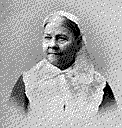

 |
 |
 C.L. Sholes  1843 Sentinel Building |
In the early days of statehood abolition of slavery, women's rights, and the temperance cause were inextricably intertwined, and the advocate of one was apt to be the advocate of all. Two of the Free-soil newspapers of Wisconsin, the Southport (Kenosha) Telegraph, edited by C. L. Sholes, and the Oshkosh True Democrat, under the management of James Densmore, were early champions of woman suffrage. In 1849 Densmore challenged the editor of the Milwaukee Sentinel to say why women should not have a voice in making laws. Densmore said he expected to be called a "visionary fanatic" for taking such a stand. The Sentinel replied May 31 in a tone of levity, "Women are confessedly angels, and angels do not vote." |
 James Densmore |
|
The question, nevertheless, would not down. As early as July 1, 1851 the Athenaean Society of the University of Wisconsin debated, "Resolved, That the female sex are not inferior to the male sex--that they should enjoy like facilities with the latter for acquiring a liberal education, and that the right of suffrage should be extended to them." |
||
 Lucy Stone |
In 1853 Clarina Howard Nicholson and Lydia Fowler toured the state making public addresses in favor of temperance and incidentally scattering suffrage seed. Two years later, in the autumn of 1855, Lucy Stone visited Wisconsin and gave lectures in several of its larger towns. As only the progressive papers noticed her visit it is not possible to reconstruct her itinerary. She spoke at Madison three times: the evenings of November 9 and 10 were devoted to "Woman's Rights"; Sunday, the eleventh, she spoke on slavery. Her lectures were largely attended, and those who heard her were "agreeably disappointed" both in her manner and in the subject matter of her addresses.3 November 21 to 23 she was at Kenosha, where the first lecture "gave the highest satisfaction" and she was recognized as "confessedly at the head of the able women engaged in that calling."4 In her suffrage lectures Lucy Stone advocated the circulation of petitions to the legislature for an amendment to the state constitution permitting women to vote. Three such petitions were presented by C. C. Sholes, senator for Kenosha County, to the senate during the session of 1856. They were referred to the committee on the expiration and reenactment of laws, and never heard from again.5 In the assembly at the same session a more advanced step was taken. January 22 Hamilton H. Gray, editor and Democratic member from Lafayette County,6 introduced a "bill to extend the elective franchise to feme covert and feme sole in certain cases." This bill7 was referred to the judiciary committee, which reported adversely on its passage; on March 12 it was laid upon the table. There is an unverified tradition that the first society for the promotion of woman suffrage in Wisconsin was organized at Janesville, before the Civil War, probably as the result of the lectures of Lucy Stone. No records of its meetings have been found.8 |
|
3Madison Wisconsin State Journal, Nov. 13, 1855.
4Kenosha Tribune and Telegraph, Nov. 22, 1955.
5Senate Journal, 1856, 197. The following names are given: "Three petitions of R. H. Deming, Janet Bone, Anna Lewis, E. M. Brande, and others in relation to granting the right of suffrage to females."
6Hamilton H. Gray was an editor who conducted the ablest newspaper in Lafayette County, called The Pick and Gad. It was begun in 1854 and contained literary reviews and discussions of social and economic questions. Editor Gray was an advanced thinker, a friend of enfranchisement for all the oppressed. He probably heard Lucy Stone at Shullsburg, where he was then publishing The Pick and Gad. This information was received from P. H. Conley, of the Lafayette County Historical Society.
8The Janesville Gazette, April 29, 1856, announced a lecture on the "Social and Domestic Influence of Women," by Miss Delphia P. Baker, who was "opposed to the strong-minded feminines of these latter days." This lecture may have been intended to counteract the influence of the woman's rights society.